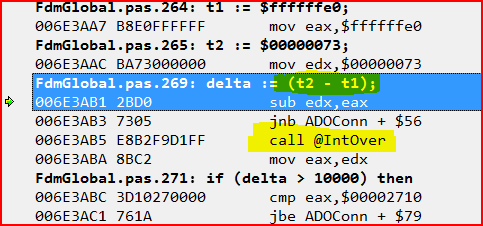i have bit of code that causes an underflow:
var
t1, t2, delta: DWORD:
begin
t1 := 0xffffff00;
t2 := 0x00000037;
delta := (t2 - t1);
The subtraction itself does generate an overflow (underflow), but i don't want Delphi to throw an EIntOverflow exception. So i try disabling the generation of overflow checking code by disabling overflow checking:
var
t1, t2, delta: DWORD:
begin
t1 := 0xffffff00;
t2 := 0x00000037;
{$OVERFLOWCHECKS OFF}
delta := (t2 - t1);
{$OVERFLOWCHECKS ON}
Yet even with the OVERFLOWCHECKS OFF option, it still throws an exception. And the generated code still contains the check:
A reminder of the documentation on $Q:
Overflow checking
Type Switch
Syntax {$Q+} or {$Q-}
{$OVERFLOWCHECKS ON} or {$OVERFLOWCHECKS OFF}
Default {$Q-}
{$OVERFLOWCHECKS OFF}
Scope LocalRemarks
The $Q directive controls the generation of overflow checking code. In the {$Q+} state, certain integer arithmetic operations (+, -, *, Abs, Sqr, Succ, Pred, Inc, and Dec) are checked for overflow. The code for each of these integer arithmetic operations is followed by additional code that verifies that the result is within the supported range. If an overflow check fails, an EIntOverflow exception is raised (or the program is terminated if exception handling is not enabled).
The $Q switch is usually used in conjunction with the $R switch, which enables and disables the generation of range-checking code. Enabling overflow checking slows down your program and makes it somewhat larger, so use {$Q+} only for debugging.
How do i use $OVERFLOWCHECKS OFF to disable the generation of overflow checking code?
Mason's answer worked. The revised code is:
var
t1, t2, delta: DWORD:
begin
t1 := 0xffffff00;
t2 := 0x00000037;
delta := Subtract(t2, t1);
{$OVERFLOWCHECKS OFF}
function Subtract(const B, A: DWORD): DWORD; //subtract B-A
begin
{
Disabling overflow checking does not work at the line level,
only the routine level.
Hence the function to subtract two numbers.
}
Result := (B-A);
end;
{$OVERFLOWCHECKS ON}
For google crawler, alternate question phrasing: How to temporarily disable overflow checking in Delphi?


$RANGECHECKS... But +1 "This answer is useful) – Assyria